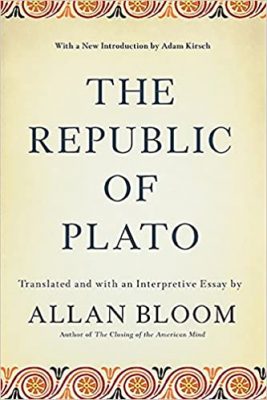The Republic is Plato’s work about the nature of justice and how a just man contributes to the development of a just society. It was published in the year 375 B.C. and is the most famous of Plato’s works.
Plato’s main aim in the Republic is to explain that justice is a form of good in itself and that justice among individuals can lead to a perfect state. In the early part of the book, Plato defines political justice as a balance among the parts that make up a state. These parts are the producers, composed of farmers and craftsmen; the warriors; and the guardians, who rule the state. When these parts of society are balanced, that society is said to be just. Each of these groups must contribute to the state according to its capacity. And so, producers must focus on producing goods and services, warriors must enforce the rulers’ decisions, and the rulers must apply their wisdom to ensure the citizens are leading a happy and productive life. There should be no interference between these three classes of society.
Plato explains that individual justice is the same as political justice. He asserts that the human soul comprises three parts that match the three parts of society. The first part of the human soul is the rational part, which is the thinking part and the one that is interested in truth and philosophical ideas. The second part of the soul is the spirit, where emotions spring from. The third part of the soul is the appetite, where all the worldly desires come from. Plato proceeds to explain that just like the three parts of society, the three parts of the soul can only achieve harmony when each part focuses on its own strength. The rational part should dominate, while the spirit and the appetite should follow the dictates of the rational part. Any of these parts should not interfere with the functioning of the other parts in much the same way that each component of a harmonious society should not interfere with the others’ functions. Plato is trying to prove that the motive that should run the state is the same motive that pushes the individual classes to do their own work. Producers are motivated by their love for money, warriors are fueled by their strong emotions such as bravery, and rulers are governed by their rational part.
The Republic contains three analogies, including the famous Allegory of the Cave. Plato states that the universe has two parts: the physical world and the world of ideas. The physical world is where humans live, while the world of ideas is composed of Forms. These Forms are the sources of beauty and goodness that can be found in the physical world. However, copies of beauty and goodness in the physical world are imperfect. The physical world is ever-changing and is not perfect, while the ideal world is perfect and permanent. Because the world of the Forms is permanent, Plato says that it is the one that holds more knowledge. Meanwhile, the physical world, because of its changing nature, deserves only the attention of the senses.
In Plato’s perfect society, only the philosopher-kings can understand the Forms. Since they are the only class that is ruled by their rational part, they are the only ones who can grasp the truth. Plato believes that philosophers are the only ones who can tell what is illusory and what is permanent. Plato illustrated this using the Allegory of the Cave. In this allegory, a group of people are chained inside a cave and can see only shadows on the wall. Plato says the shadows are nothing but illusions. In the story, Plato had one prisoner escape from the cave and discover the real world outside. The former prisoner then realizes that the shadows in the cave are illusions and not real. His eyes are overwhelmed by the real world and almost blinded by the sun’s brightness. However, his eyes eventually adjusted to the real world, and he could finally look at the sun. This allegory also illustrates Plato’s idea of education, wherein he believes that the purpose of education is not to put knowledge into the soul but to induce the soul to seek the truth beyond the physical world.
To Plato, philosophers are the only individuals with the most knowledge about justice. Their minds are naturally inclined to carry out their rational parts. Plato contrasted his philosopher-kings to men who are the most unjust — tyrants. He described tyrants as individuals who are driven by their irrational appetites. Tyrants are the most dangerous and unfortunate thing to happen to citizens of a state. All kinds of injustices would then happen under the tyrants’ rule. This would then result in enormous misery in the lives of the citizens. At the same time, that tyrant would be tortured by his conscience. Using this argument, Plato concludes that justice is a form of good in itself.
In the latter part of the Republic, Plato contends that the three classes of society have their own ideas of happiness and the good life. It is natural that the producers are happy with money, and the warriors are happy expressing their courage and honor for the state. Despite this, however, the warriors and the producers should carry out the decisions of the philosopher-kings.
Plato clarifies that poets are banned from their ideal state. He claims that poets create art that stirs up unjust notions in the human mind and heart. Plato thinks that it is dangerous for people to sympathize with the crass emotions of characters found in the works of poets, as people may live out these sympathies in real life.
At the end of the Republic, Plato narrates the Myth of Er, which tells about the fate of a soul after the death of an individual. According to Plato, although bodies die, souls are endlessly reborn, and each soul must decide about its next life.
